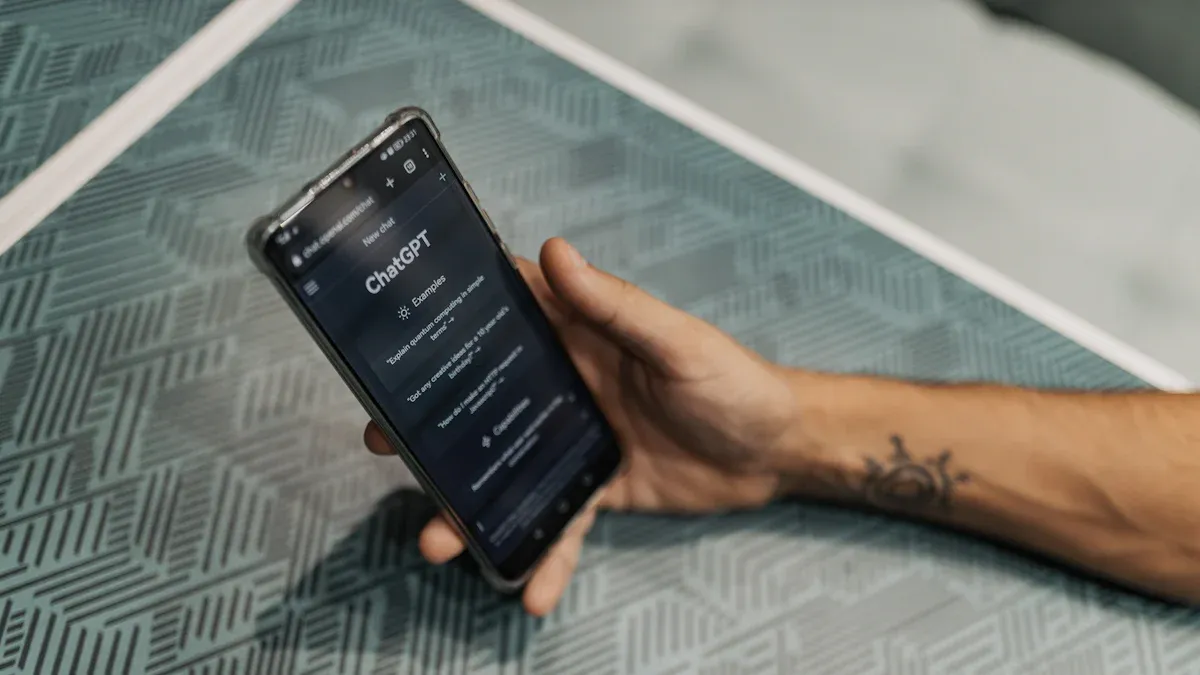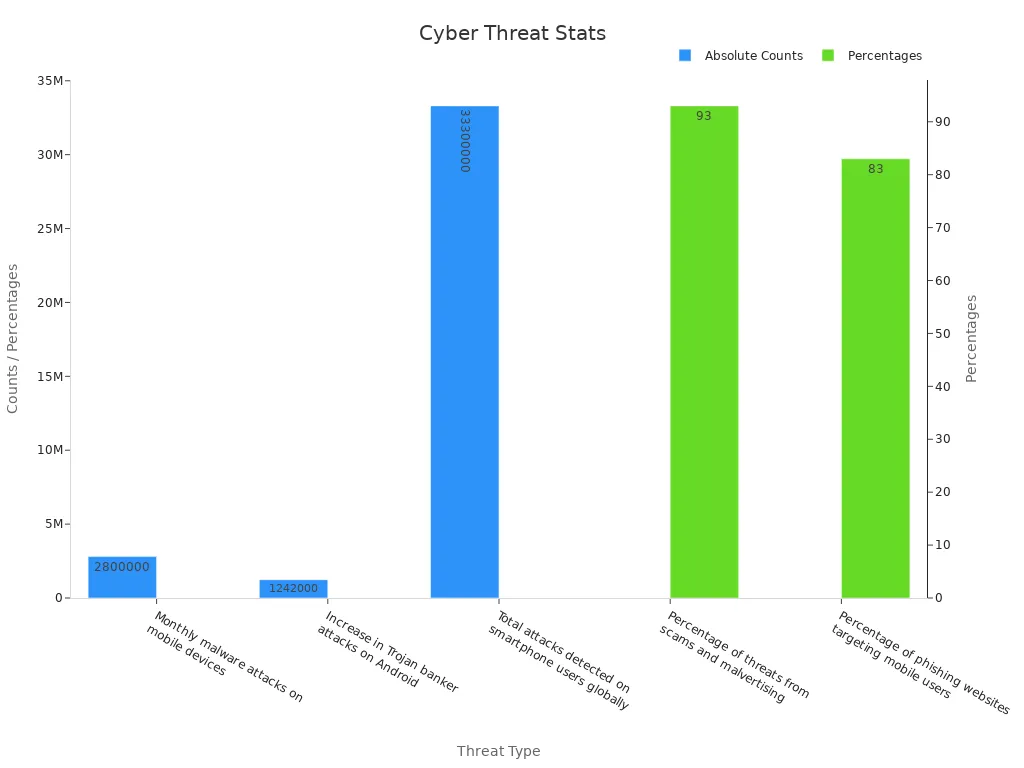
Quantum technology in phones is revolutionizing how we keep our devices secure. Tools like Quantum Random Number Generators (QRNGs) create robust, random codes that are so unpredictable that hackers cannot crack them. For instance, Samsung's Galaxy Quantum 5 is equipped with a QRNG chip that utilizes quantum science to detect random light particle states. This advanced technology safeguards private information in banking and social applications. With quantum security, your personal data remains safe and private.
Key Takeaways
-
Quantum Random Number Generators (QRNGs) make codes that can't be cracked. This keeps your smartphone data safe from hackers.
-
Quantum Key Distribution (QKD) helps secure chats by spotting spies. It keeps your messages secret.
-
By 2025, smartphones will use quantum tech to boost safety. It will protect mobile payments and personal information.
The Current Challenges in Smartphone Security
Common cyber threats targeting smartphones
Smartphones face more cyber dangers every day. Malware, phishing, and Trojan attacks are the most common. In 2022, hackers targeted over 33.3 million smartphone users worldwide. Each month, 2.8 million malware attacks happened. Phishing websites aimed at mobile users made up 83% of all phishing attempts. These threats often look like safe apps or links, making them hard to spot.

Adware and riskware are also big problems. In just three months of 2022, over 5.5 million of these threats were stopped. These attacks can steal your data or flood you with annoying ads. About 45.4% of people have faced SMS scams. This shows how often smartphones are under attack.
Why traditional encryption methods are no longer sufficient
Old encryption methods worked well before but now fall short. Hackers have better tools to break through these systems. Encrypted devices also make things harder for law enforcement. Courts struggle with cases involving encrypted data, leading to mixed decisions. These problems show why stronger security is needed for smartphones.
The urgent need for innovative security solutions
Cyber threats are growing fast, so better security is needed now. The mobile security market is expected to grow from $6.1 billion in 2023 to $38.02 billion by 2033. This is a compound annual growth rate (CAGR) of 20.1%.
|
Statistic Description |
Value |
|---|---|
|
Projected Mobile Security Market Size by 2033 |
USD 38.02 billion |
|
Market Size in 2023 |
USD 6.1 billion |
|
CAGR (2024-2033) |
20.1% |
This growth shows the need for better tools to protect data. As threats change, security tools must improve too. Quantum technology could be the answer, keeping smartphone security strong and ready for the future.
The Role of Quantum Technology in Phones
How QRNGs create unbreakable encryption keys
Quantum technology has brought a new tool: quantum random number generators (QRNGs). Unlike older methods, QRNGs use quantum science to make random numbers. These numbers are key to creating codes that hackers cannot guess or break.
QRNGs work by using tiny particles, like photons, to make numbers. These particles act randomly, making the codes they create very secure. This makes QRNGs perfect for industries like banking and cloud storage, where safety is crucial. As cyber threats grow, QRNGs help keep your smartphone data safe.
Tip: QRNGs let your phone create codes that even top hackers cannot crack.
Quantum Key Distribution (QKD) and its impact on secure communication
Quantum key distribution (QKD) is another amazing part of quantum tech. It uses quantum physics to safely share secret codes between two people. QKD works because of special quantum rules:
-
Superposition: Tiny particles can be in many states at once, keeping data safe.
-
Quantum Entanglement: Two linked particles share information securely, even far apart.
-
Heisenberg’s Uncertainty Principle: If someone tries to spy, the particles change, and you’ll know.
QKD is super secure because it follows physics laws, not just math. Even future quantum computers cannot break it. If someone tries to steal the code, the system notices and warns you, keeping your data private.
With QKD, your phone can stop spying attempts, keeping your chats safe.
Post-quantum cryptography and hybrid encryption methods
Post-quantum cryptography (PQC) is built to handle quantum computer attacks. It uses strong math to protect your phone from future threats. Scientists are also mixing PQC with tools like QKD to make security even better.
|
Study |
Focus |
Findings |
|---|---|---|
|
Chikouche & Ghadbane |
PQC on mobile devices |
PQC works well on phones, balancing speed and power use. |
|
Mueller et al. |
PQC with DNSSEC |
Showed the need for flexible PQC to fight quantum risks. |
|
Djordjevic |
Hybrid cryptographic system |
Suggested combining QKD and PQC for stronger security and longer reach. |
These tools make sure your phone stays safe, even as quantum tech grows. By using PQC and hybrid methods, quantum tech keeps your data secure for the future.
Quantum Technology in Smartphones by 2025

Real-world applications, including the VERTU Quantum Flip
Quantum technology is no longer just an idea for the future. By 2025, smartphones will use quantum processors and quantum-safe tools. These upgrades will help phones solve hard problems like delivery routes or weather predictions. They will also make artificial intelligence smarter and faster for apps.
One example is the VERTU Quantum Flip Cyber Pre-Order Exclusive Package. This high-end phone mixes style with quantum tech. It uses Quantum-Bound BB84 Encryption to keep your chats private. Even the best hackers cannot break its security. The phone has two screens, a Snapdragon 8 Gen4 chip for speed, and a strong King Kong Axis hinge. It shows how quantum tech can make phones both powerful and stylish.
Did you know? Only 99 VERTU Quantum Flip phones are available worldwide. It’s not just a phone; it’s a mix of luxury and innovation.
How quantum technology enhances mobile payments and personal data security
Mobile payments are now a big part of life but face risks. Quantum tech fixes this with quantum-digital payments. These payments use quantum cryptography to stop hackers, even those with supercomputers. Quantum cryptograms protect your payment details and confirm transactions safely.
For instance, a quantum-secured app makes a new quantum key for every payment. This key keeps your payment info safe from being stolen or changed. Quantum chips in phones also create strong encryption keys. These keys make it nearly impossible for hackers to steal your private data.
Quote: “Quantum technology improves mobile payments by using quantum cryptography, protecting against powerful cyber threats.”
Companies leading the quantum security revolution
Many companies are making quantum tech for safer smartphones. These leaders are shaping a secure digital future:
-
SK Telecom: Built Quantum Key Distribution (QKD) for safe communication in finance and government.
-
Toshiba Corporation: Made QKD systems to protect important financial and government data.
-
NEC Corporation: Created secure quantum communication networks with QKD.
-
ID Quantique: Released the first commercial QKD systems for critical data safety.
-
QuintessenceLabs: Focuses on quantum encryption to improve data security.
-
Quantum Xchange: Offers secure data transfer with QKD and post-quantum cryptography.
These companies are pushing quantum tech forward. By 2025, their work will make quantum security a normal feature in smartphones.
Implications for Smartphone Users
Better privacy and safety from cyberattacks
Quantum tech is changing how phones keep your data safe. Tools like quantum random number generators (QRNGs) make codes hackers cannot guess. These codes protect your phone’s security. For example, the Samsung Galaxy A Quantum uses a tiny QRNG chip to secure data.
Quantum tools also stop attacks before they reach you. Vodafone’s Secure Net, powered by quantum tech and IBM, blocked 1.8 billion attacks in 2023. These tools help keep your personal info safe and give you peace of mind.
How quantum tech helps in daily smartphone use
Quantum tech isn’t just for scientists; it’s part of your life now. It secures payments, protects messages, and keeps apps safe. QRNGs and post-quantum cryptography make hacking much harder. Whether you shop online or chat with friends, quantum tools protect your data.
Phones like the VERTU Quantum Flip show quantum tech in action. Its Quantum-Bound BB84 Encryption keeps your chats private. These features make smartphones safer and more trustworthy in today’s digital world.
How these changes will shape mobile security’s future
By 2025, quantum tech will change mobile security forever. Post-quantum cryptography will protect sensitive data as a standard feature. Quantum Key Distribution (QKD) will stop even the smartest hackers. Defense and finance industries will use NIST-approved encryption to secure data. Large-scale post-quantum cryptography will also begin, creating a safer economy.
These upgrades will make phones stronger against cyberattacks. As quantum tech grows, it will build a safer digital world for everyone. Your phone will stay ahead of threats, keeping your information secure.
Quantum technology improves phone security by fixing weak spots. Tools like QRNGs and QKD keep your data safe. These tools help you use your phone without fear of hackers. Your personal information stays protected from online threats.
FAQ
Why is quantum encryption stronger than older methods?
Quantum encryption uses science to make codes that cannot be broken. Older methods depend on math, which hackers can figure out over time. Quantum tools keep your data safe from attacks.
Tip: Quantum encryption spots spying attempts and protects your private info.
Will quantum tech raise smartphone prices?
Not always. Fancy phones like the VERTU Quantum Flip have high-end features. But many companies want to make quantum security cheap for everyone.
How does quantum tech secure mobile payments?
Quantum cryptography creates a new key for every payment. This stops hackers from stealing or changing your payment info. It makes mobile payments safe and secure.
Emoji Insight: 🛡️ Quantum tech works like armor for your money!




